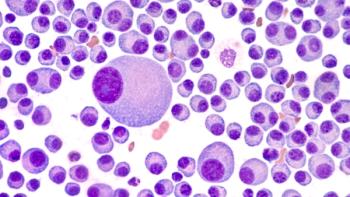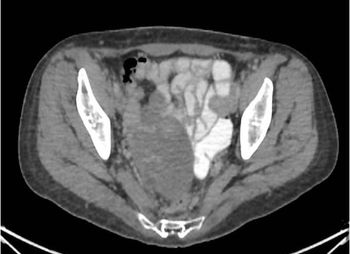
A poster presented at the 2020 San Antonio Breast Cancer Symposium found a trend towards less frequent care refusal when a safety net hospital introduced nurse breast navigators.

Your AI-Trained Oncology Knowledge Connection!


A poster presented at the 2020 San Antonio Breast Cancer Symposium found a trend towards less frequent care refusal when a safety net hospital introduced nurse breast navigators.

The latest episode of CancerNetwork’s podcast focuses on the rising incidence rates of colorectal cancer in both young and black patients.

Daratumumab plus lenalidomide, bortezomib, and dexamethasone improved response rates and depth of response in patients with transplant-eligible, newly diagnosed multiple myeloma.

A study presented at the 21st Annual Meeting of the Society of Urologic Oncology found that the implementation of telemedicine was able to significantly reduce or eliminate travel and financial burdens for patients seeking quality urologic cancer care.

An update on the PROSPER trial analyzing enzalutamide plus androgen deprivation therapy found a lower risk of death than placebo for patients with non-metastatic CRPC.

A study from the 21st Annual Meeting of the Society of Urologic Oncology concluded that active surveillance is a safe management strategy for patients with small renal masses suspicious for renal cell carcinoma.

Research presented at the 21st Annual Meeting of the Society of Urologic Oncology found organized telehealth systems effectively lessened the impact of the coronavirus disease 2019 pandemic on appointment cancellations.

Research suggested oncologists may recommend specific timeframes in which cystectomy should be performed to avoid unnecessary mortality due to delays.

A recent study found that rural non-Hispanic whites and blacks have experienced increased HCC case incidence rates, while urban areas have seen the rate decline since 2009.

A study published in JAMA Surgery found that low quantity and low quality of muscle can predict poor outcomes after colon cancer surgery.

The latest episode of the journal ONCOLOGY’s podcast features an article published in the November issue discussing fertility preservation and decision-making for young adults with cancer.

The risk of developing testicular cancer may increase with early and repeated exposure to diagnostic imaging, according to a recent study.

A study published in American Journal of Preventative Medicine found that expansion of the Affordable Care Act resulted in an increase in early-stage cancer diagnoses and a decrease in late-stage cancer rates for patients.

A study published in The BMJ found that even a slight 4-week treatment delay is associated with increased mortality across a number of indications for 7 cancer types.

The latest installment of “Oncology Peer Review On-The-Go” dissects original research published in the journal ONCOLOGY regarding potential barriers to clinical trial enrollment for patients with pancreatic cancer.

A recent study found that automated analyses of CT scans for patients with breast cancer can predict which patients are likely to develop cardiovascular disease in the future.

AstraZeneca and Merck announced that the combination treatment of olaparib with bevacizumab to treat adult patients with advanced high-grade epithelial ovarian, fallopian tube or primary peritoneal cancer was approved in the European Union.

A study presented at the 12th European Breast Cancer Conference suggests women over the age of 70 with breast cancer can tolerate surgery even though they aren’t offered it regularly, but a second abstract suggests these women tend to opt out of this treatment option.

The results for the phase 2 SUMMIT trial examining neratinib to treat patients of metastatic non-small cell lung cancer (NSCLC) were recently announced by Puma Biotechnology.

A study revealed that the way data is collected regarding women with benign breast diseases can provide insight into which non-cancerous disorders are likely to become cancerous in the future.

A study led by Jefferson researchers found that not all patients, specifically African American patients and women without private insurance, receive the same breast cancer treatment, specifically the beneficial and more cost-effective hypofractionated whole breast radiation therapy.

The newest episode of Oncology Peer Review On-The-Go speaks with 2 authors of an article from the October Issue of the journal ONCOLOGY focusing on effective cancer care management during the coronavirus pandemic.

A recent study published in Science evaluated DNA changes in healthy and disease-laden bladder tissue, finding that cancer-driving mutations are common in healthy bladder tissue.

A study led by researchers from City of Hope found that there is not a significant enough effort being made to representing older adults with cancer in clinical trial populations for new cancer drugs.

Cycle 3 of the FLASH study reported that patients taking SGX301 to treat cutaneous t-cell lymphoma saw improved responses and maintained a positive safety profile.

Genmab recently announced positive topline results from part 2 of the Phase 3 CASSIOPEIA study examining daratumumab monotherapy as maintenance therapy to treat patients diagnosed with multiple myeloma.

A recent examination of breast cancer subtypes, specifically luminal A and luminal B breast cancer, found that incidence rates from 2010-2016 increased for a number of racial/ethnic and age groups.

Merck announced positive data regarding 2 studies, one examining pembrolizumab in combination with chemotherapy and another in combination with quavonlimab in combination to treat advanced non-small cell lung cancer.

A study published in the Annals of Oncology suggests a better method involving tumor gene tests for estimating the survival of women with aggressive ovarian cancers.

A third data cut-off reassessment by the German Institute for Quality and Efficiency in Health Care found enzalutamide provided an added benefit for patients with high-risk non-metastatic castration-resistant prostate cancer.